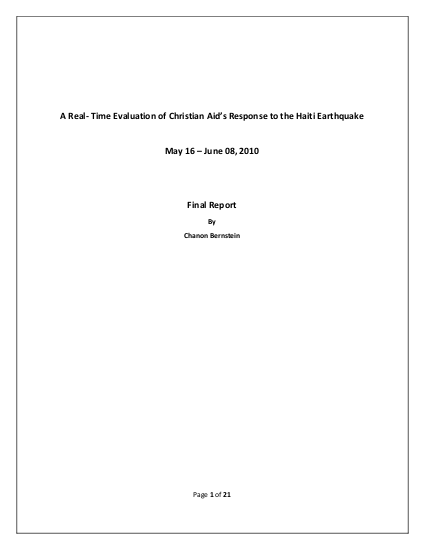
The objective of Christian Aid’s emergency response was to support immediate relief and to enable the early recovery of directly and indirectly disaster affected communities. Emergency response activities were designed to empower people to build their lives back better than they had been before the disaster.
Planned emergency response activities included the distributions of cash, food, shelter and Non-Food Items (NFIs), as well as livelihood support. Targeted beneficiaries included vulnerable individuals and families living in their own houses, inhabiting planned or spontaneous camps, as well as IDPs who had moved in with those who had not been directly affected by the earthquake.
The main aim of the RTE was to enable Christian Aid and its partners to reflect and learn from their experiences to date in order to influence the next phase of programmes. In order to do this, the RTE examined: • how the implementing chain of headquarters to field office to partner to beneficiary functioned • the quality and timeliness of decision making and programming
The RTE framework was designed to explore issues of appropriateness and timeliness, coordination, coverage, appropriateness and effectiveness, efficiency, as well as connectedness and sustainability. In addition, the evaluator was asked to include recommendations as well as to propose a program strategy.
Resource collections
- Earthquakes
- Evaluating humanitarian action
- Learning from crises
- Monitoring of humanitarian action
- Topics
- UN Habitat - Urban Response Collection
- Urban Response - Urban Crisis Preparedness and Risk Reduction
- Urban Response Collection - Community Engagement and Social Cohesion
- Urban Response Collection - Economic Recovery
- Urban Response Collection - Environment and Climate Change
- Urban Response Collection - Housing, Land and Property
- Urban Response Collection - Urban Crisis Response, Recovery and Reconstruction
- Urban Response Collection - Urban Resilience
